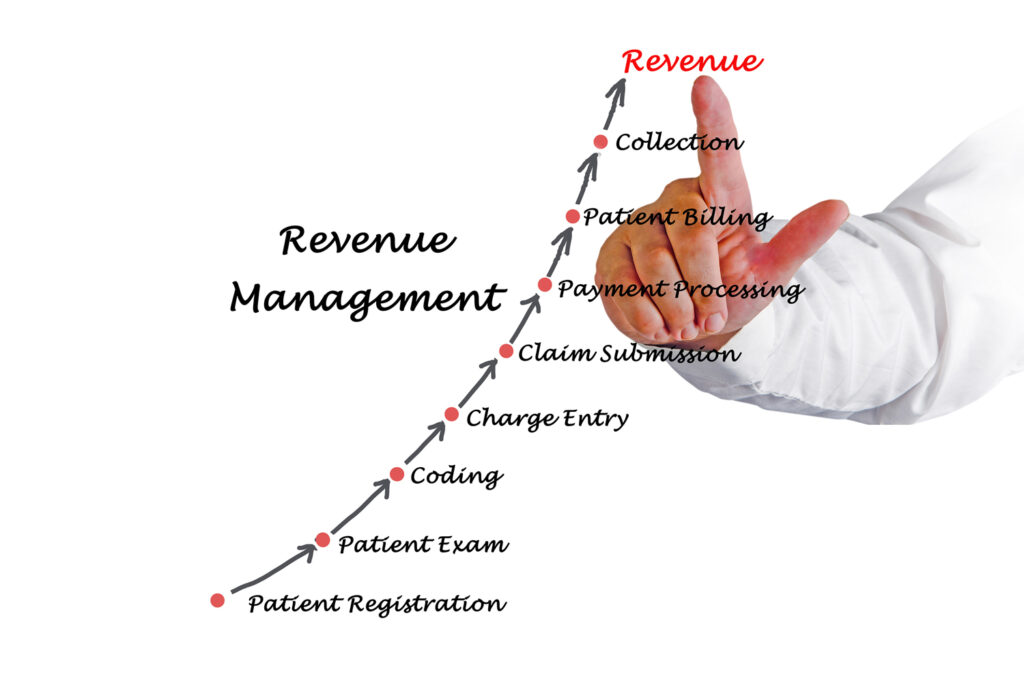Revenue Cycle Management
- Home
- Service
- Revenue Cycle Management

Revenue Cycle Management by Code Billium (CB)
Healthcare providers face an ongoing challenge to balance patient care and financial sustainability. Code Billium (CB) specializes in Revenue Cycle Management (RCM), ensuring that healthcare organizations can manage claims, payments, and revenue efficiently while maximizing both patient outcomes and financial success.
What Is Revenue Cycle Management (RCM)?
Revenue Cycle Management is a comprehensive financial process that begins when a patient schedules an appointment and ends with the collection of payments. It encompasses:
- Pre-visit Tasks: Appointment scheduling, insurance verification, and pre-registration.
- During the Visit: Capturing charges and coding diagnoses and treatments.
- Post-visit Processes: Claims submission, payment collection, and denial management.
RCM’s goal is to ensure healthcare providers receive timely, accurate payment while maintaining operational efficiency.
The Importance of Front-End Optimization
Efficient RCM starts with front-end tasks:
- Insurance Verification: Ensures patients are eligible for the services provided, preventing claim denials.
- Pre-Registration: Establishes detailed patient accounts, including medical history and coverage details.
Errors in these areas can disrupt the entire claims process, making front-end optimization critical for success.
Claims Submission and Denial Management
Once services are rendered, claims must be submitted for reimbursement. Key components include:
- Charge Capture: Recording all billable services accurately.
- Coding Accuracy: Selecting appropriate ICD-10 codes to prevent claim denials.
Claim denials remain a major challenge, with hospitals experiencing a 23% increase in denials from 2016 to 2020. CB helps healthcare organizations implement strategies like:
- Staff training in coding and billing.
- Automating coding and verification processes.
- Using data analytics to identify and address denial trends.
Leveraging Data Analytics in RCM
Data analytics plays a pivotal role in optimizing RCM by:
- Tracking claims from submission to resolution.
- Identifying patterns in claim denials.
- Enhancing care coordination under value-based care models.
Analytics tools provide insights into the quality of care, patient satisfaction, and costs, helping organizations maximize reimbursement and improve financial health.
Overcoming RCM Challenges
Healthcare organizations face several challenges in RCM, including:
Patient Financial Constraints: High deductibles often delay payments. CB helps organizations balance timely collection with patient satisfaction.
Coding Errors: Mistakes in coding lead to denied claims. CB provides staff training and workflow improvements to ensure accuracy.
Prior Authorization Delays: CB streamlines workflows to minimize delays caused by prior authorization requirements.
Compliance with the No Surprises Act: CB assists organizations in adapting to regulations like the surprise billing rule, ensuring compliance without disrupting revenue cycles.
Key Strategies for Successful RCM
- Educating Staff: Regular training programs improve coding accuracy and chart documentation.
- Using Technology: Automation reduces manual errors and speeds up processes.
- Proactive Denial Management: Identifying and addressing issues before claims are denied.
- Patient Education: Helping patients understand medical costs to avoid confusion and delayed payments.
Why Choose Code Billium (CB) for RCM?
CB is committed to creating a seamless revenue cycle for healthcare providers. By partnering with CB, your organization benefits from:
- Reduced claim denial rates.
- Timely reimbursement for services.
- Improved patient satisfaction.
- Financial sustainability in an evolving healthcare landscape.
Contact us today to discover how CB can optimize your revenue cycle management and elevate your organization’s financial and operational performance.

